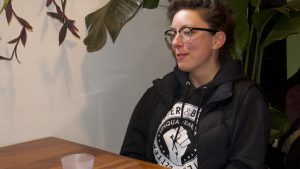Nora Dononvan
News Writer
[email protected]

City council candidate Kim Roney discusses her plans for change in Asheville.
Kim Roney announced her run for Asheville City Council in 2020.
Roney, 38, launched her campaign with a Nov. 7 video across multiple social media platforms.
“For me, it is really important to acknowledge that no one person can do the work that is needed for us to do in this community for a really strong resilient community where we care for planet earth and each other better,” Roney said. “That meant inviting more people into the conversation so that the effort to be about it being better can be a community effort.”
Roney’s campaign will be focusing on three major issues that she deals with in her everyday life.
“We need a fare-free regional transit system. Transit is at the intersection of economic mobility, equitable assets and meaningful environmental policy. I have been riding the bus for right on 11 years now and I know that it means access to groceries and housing and childcare and education and spending time with your community, but we are not doing as well as we could be,” Roney said.
Roney has adopted a car-free lifestyle since 2008.
“The reason why I say we need a regional transit system is because we need to connect more with the county,” Roney said. “Removing the fare barrier for people to get on the bus is shown every single time it’s done to increase ridership.”
It has been commonly stated that if Asheville makes the bus free or zero fare, there would be so many people on the bus, according to Roney.
“I think we definitely need so many people on the bus. Boone runs a fare free system. Chapel Hill runs a fare free system,” Roney said.
The Asheville Regional Transit bus system has been deemed problematic by UNC Asheville sophomore Isaac Lake, who claims his girlfriend has to take three different buses to get to her job.
“We need affordable transportation to downtown for people who have jobs. There needs to be more infrastructure for public transit and more jobs downtown for people with low income,” Lake said.
The second initiative Roney’s campaign emphasizes is the need for affordable housing.
“It is going to be a huge community effort. We are going to need all the partners coming in to look at what our budget allocation on housing looks like,” Roney said.
Besides being a piano teacher and community advocate, Roney volunteers at BeLoved Asheville, an organization that creates innovative solutions to some of the toughest challenges we face as a community, according to their mission statement. Roney credits their tiny home village as a step toward the affordable housing solution.
“We need all hands on deck and not just one answer,” Roney said.
The third main goal of Roney’s campaign will be a push towards participatory democracy.
“Participatory democracy includes participatory budgeting. This idea started in Brazil, and the idea is that a portion of the city’s budget is allocated for the people to decide how it is used, anything you can build” Roney said.
Durham has recently implemented participatory budgeting into their city council, as well as Greensboro, Roney said.
“If you look at what they are using it for, the people are demanding more sidewalks, more greenways, solar panels on community buildings,” Roney said.
According to Roney, participatory budgeting allows citizens to vote as early as middle school age and does not care about your documentation status, which means everyone who is participating in a community has a say in how the budget is allocated.
“Everyone who is participating in the community will have a say in how the budget is allocated. This is a really powerful way to bring more people into the conversation about what our budget and policies look like,” Roney said.
Roney described how the participatory budgeting process works.
“For example, one of my piano students would say that they need a bus stop at this location. So they present a proposal and the community would agree. And then a bunch of folks would come in and help them make a really strong proposal,” Roney said.
Participatory budgeting would take the voting process outside the government and directly involve the people.
“We could vote at libraries, at community centers, you could set up a food truck and have people vote at that location mobily. And then the city does it,” Roney said.
Roney’s hoping that by implementing this process, it will engage more people who feel like it does not matter when they use their voice.
“Their voice does matter,” Roney said.
Voting for city council will take place sometime in March.
“Local elections are the most important because everything starts at the local level,” said UNCA student Annie Brooks- Fontaine. “It is what affects you immediately.”

















